
Because having spent the beginnings of my fandom a poor boy, alone, abandon-ed in this crowded, operatic desert called Los Angeles, all I had to rely on were the Saturday afternoon Met broadcasts, the (very) occasional telecast, and recordings from the public library. We didn’t even have home video (!) “Piangi, piangi,” indeed as someone said last night.
In the beginning I wasn’t all that keen on the hurdy-gurdy early-Verdi either. All that stop and start with the oom-pah-pah accompaniment was perplexing. Most especially as the underscoring to Shakespeare’s Macbeth (?!) I mean, Otello sounded like a movie soundtrack and it hit me square between the eyes the first time I listened. Then I discovered Pilar Lorengar on the old Decca recording (you know, the one with all the sound effects where the not-so-background party guests sound like avalanche victims?). The inherent delicacy of her voice was a revelation because up until then I’d pretty much been listening to big momma sopranos singing big momma repertory.
It was only later, after much reading and a near-religious conversion courtesy of RCA and Señora Caballé, that I started to understand the near superhuman feat of singing Verdi’s consumptive handkerchief dampener.
So, it was with near-glee, tempered by decades of brutal disappointment, that I approached the Dorothy Chandler Pavilion Saturday night for what was promised to be a traditional production (what, no pickup trucks? – Lucia, I see you) sung by a cast of vocally gifted singers in roles that absolutely no one would be surprised they’d been hired for. Was it the 1980’s again?
Music Director James Conlon, who announced that he’d be leaving his post at the end of next season (after 20 years…fine, whatever, Judas), made his way into the pit to the sound of absolutely rapturous applause. I think I got a little teary-eyed at the thought and the curtain hadn’t even gone up. He waited for absolute quiet as I stiffened my critical backbone only to be destroyed by the most luscious and graceful prelude I think I’ve ever heard live. The high strings trilled so delicately and so exquisitely while their lower colleagues brought the big tune and then just the right modicum of foreboding. It’s a good thing the curtain went up when it did.
When it revealed a perfectly adequate salon in a Paris home of moderate luxe and not, say, a massive white-washed, corrugated steel wall encumbered by a giant clock, I wiped my glasses. This production, new to Los Angeles, was mounted by San Francisco Opera in 2022 for the local debut of soprano Pretty Yende. I’m hoping the reasoning behind its traditionalism is that Ms. Yende had it written into her contract that she didn’t want to spend the evening singing in only her slip or some such nonsense. But I digress.
Our own performance brought one very important local debut in the person of Armenian tenor Liparit Avetisyan as Alfredo Germont. He’s been bestowed with a sunny, full lyric voice of excellent quality with a little muscle on top. He delighted the audience with both his impetuous acting and musical phrasing, much of which was highly individual but always within the bounds of the composer’s writing. He also projected a rare sincerity with his quick smile and proved himself an excellent listener when sharing the stage. Nor was he afraid to sing quietly when called upon and I will carry the souvenir of his contribution to a gently poised “Parigi, o cara” with me for quite some time. His denunciation of Violetta at Flora’s party was all you could have hoped for and he opened Act Two with a nimble “De’ miei bollenti spiriti.” My one quibble is that he braved the unwritten, but oft-included, top C that ends Alfredo’s subsequent cabaletta. Even if he had hit it, as intended, to glory, it really doesn’t belong musically in the moment and briefly compromised his very skillful performance.
His father was played by baritone Kihun Yoon whose Sharpless in Butterfly I still remember fondly from 2016 opposite Ana María Martínez. He’s sung a number of roles with LA Opera since, participating in our young artist’s program from 2013 to 2017, and now has found acclaim in Germany in the larger roles in both the Verdi and Wagner repertoires. That mantle surely fits easily on him as he has one of those rich voices that seems of almost limitless power and amplitude. He proved himself scrupulous to the composer’s markings in the double duets of Act Two and made a noble contribution to the final scene with his resigned contrition.
Which brings us naturally to the vagaries of this staging by Shawna Lucey who recreated her original San Francisco Opera production. Two points of her thoughtful work here didn’t ring completely true and the first was when Giorgio Germont confronts his son and begs him to return home to his family. When Alfredo briefly defies, his father delivered a resounding slap to his face that shocked the audience. Ms. Lucey then uses the scene’s brief cabaletta, which talks of forgiveness, to have Germont the father show remorse for his rashness. The subtext of the previous scene with Violetta shows Germont to be nothing if not compassionate and considered in action and deed. Despite achieving the desired effect, it could have been set up better to land with the audience.
The other moment happened in the great concertato at Flora’s party after Violetta has been unjustly humiliated. One by one, the other attending ladies brutally shirked off their male escorts to join Violetta on her side of the stage in solidarity. On the surface it’s a marvelous idea but the exact way that each of these women separated themselves from their partners, using the same flamboyant, round-armed gesture, showed no individuality. It also compromised the general realism of the staging which veered suddenly into abstract stylization. More importantly, it detracted from the great humanity in Verdi’s writing at that moment. Verdi himself was most assuredly a feminist and the chorus, male and female, are all sympathetic to Violetta at that point both in the lyrics and music. Although Ms. Lucey’s point was made, once again, it could have been set up in a more naturalistic fashion and perhaps have gained greater impact.
Sympathy for this Violetta was certainly not hard won, I might add. Rachel Willis-Sorensen made her debut with the company last year with a sumptuous Desdemona and I was most eager to see her take on Verdi’s great soprano steeplechase. She did not disappoint. My first impression was how refreshing it was to have a Violetta who wasn’t on her last legs when the curtain went up on Act One. This appreciation should certainly be shared by Ms. Lucey’s conception as well. Ms. Willis-Sorensen was bubbly and alive in the opening party scene and gradually and gracefully transitioned as an actress to her demise rather than telegraphing it throughout the evening. We all know it’s a tragedy going in. She laughed at herself during the “Sempre Libera” and I think it was the first time I’ve seen a soprano who wasn’t laughing cynically at her own fate which was humanizing. Another fine touch.
She has a golden voice, brocaded with silver on high and a glamorous, rich mezzo-ish bottom. She sang with a supreme dexterity all evening and her Italian is beautiful. She also knows when to put her foot on the gas so her initial refusal in her interview with Germont garnered mid-scene applause. Later she really let loose with a massive “Amami, Alfredo” which was very exciting. It’s a great pleasure to hear a soprano in this highly demanding role who you know can easily fulfill Verdi’s requirements. I have no doubt her interpretation will only deepen as time goes on.
I’m also happy to report that Maestro Conlon gave us almost all of the score. Although we were denied the second verse of Violetta’s opening cavatina, we did get both of “Addio del passato” (which were adeptly differentiated by our soprano) and the whole of the Alfredo/Germont scene that closes Scene 1 of Act II. The only quibble I have is that with such a luxurious Violetta, we could have gotten a small ritardando on the three big phrases she sings spanning the gambling scene starting with, “Che fia? morir mi sento.” I’m sure if it was actually written in the score, we would have heard it, and I’m probably used to some old hoary tradition I’ve heard on recordings. Still, with such a Violetta, I’m greedy.
The LA Opera Orchestra’s contribution throughout was superlative and the strings especially were fantastic with all their tight configurations. This is to say nothing of the Chorus which made real music in the aforementioned party scene. The women especially displayed a light touch in the “Zingarelle” chorus on their ascending phrases which were especially lovely.
Sets and Costumes courtesy of Robert Innes Hopkins were inoffensive and fairly simple. Violetta’s salon was an excellent space that was utilized well. The country house and Flora’s party were colorful but lacked imagination. Costumes were in very bold, almost electric, primary colors and presented better onstage than they photographed thanks to the very astute lighting plot of Michael James Clark executed here by Davida Tkach. Still, it was one of those shows where it looks like Paris has only one dressmaker. Far better, I must admit, than the current Met production whose costumes look like they’ve been borrowed from a bus and truck of Disney’s Beauty & the Beast. I remember Mr. Hopkins production of Rossini’s L’Italiana in Algeri at Santa Fe years back and was expecting more.
Oh, and whomever re-lit the front curtain at the Dorothy Chandler Pavilion deserves a medal. I haven’t seen it look that good ever.
I also have to mention that in Act Two Ms. Willis-Sorensen cast a spell over the audience with a “Dite alla giovine – sì bella e pura” that held everyone enraptured. At the second repeat, with the baritone joining in, some numbskull’s cellphone started quietly chiming along (not entirely out of the key signature mind you). She actually managed to discreetly and almost imperceptibly pull the audience’s focus back to the stage where it belonged. Conquering Verdi’s Violetta is one thing but triumphing over an errant cellphone is quite another. Brava Diva!
Theatrically, I think the enthusiasm of the audience was greater than any performance I’ve attended at LA Opera, many reacting to plot points with surprise like it wasn’t their 20th production (guilty). This whole review is simply one big string of quibbles, frankly. I could also stick to the answer I gave my friend when he asked what I thought and just say, “It was glorious.”
Photos: Cory Weaver














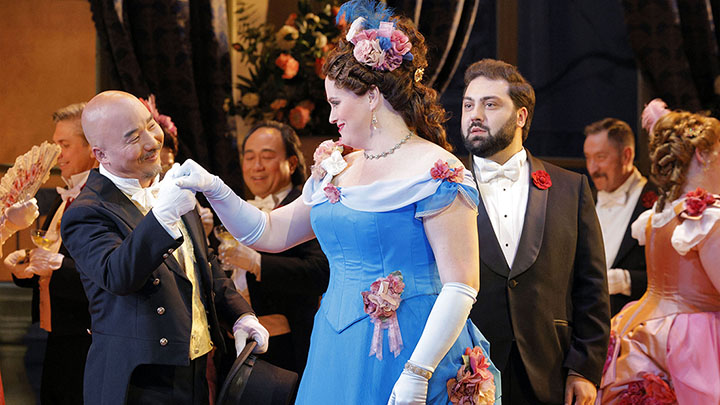
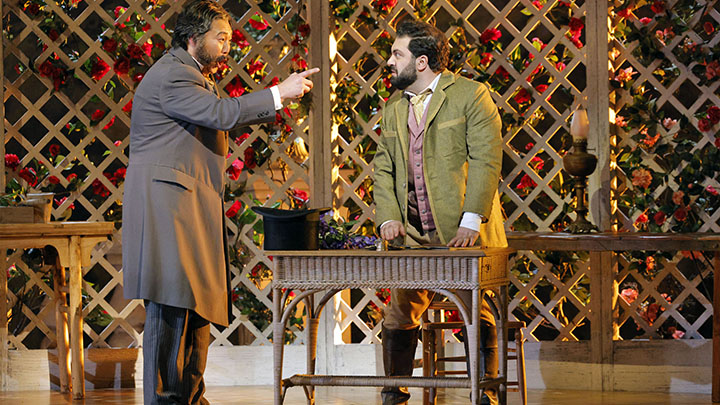
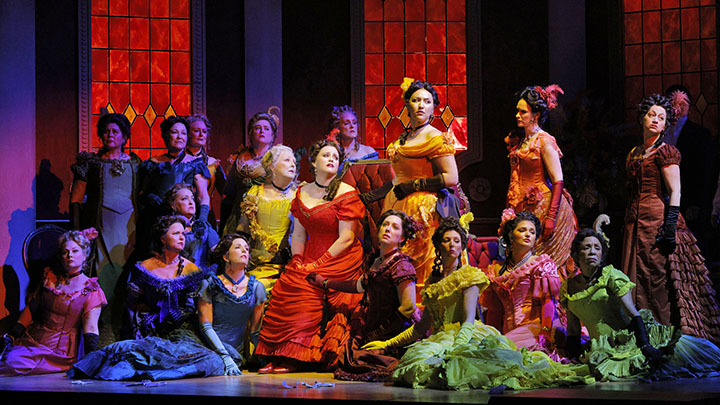
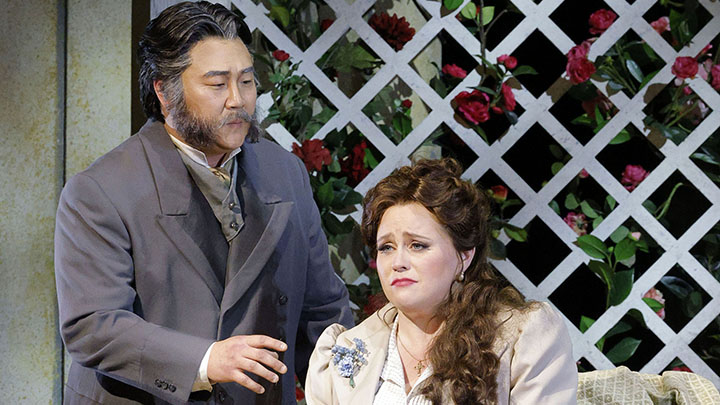
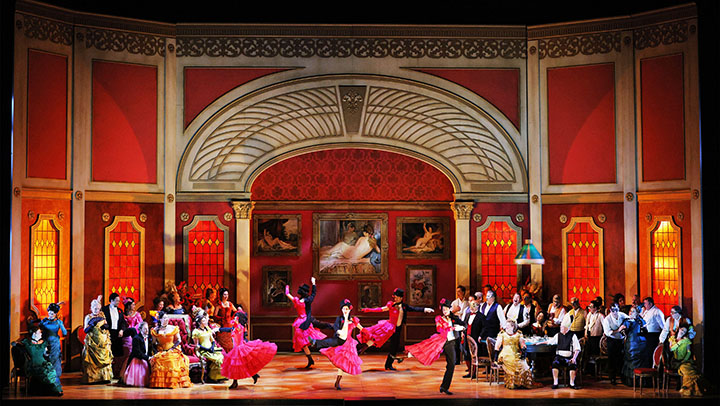











Comments